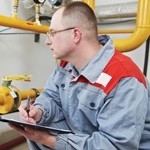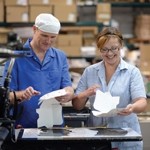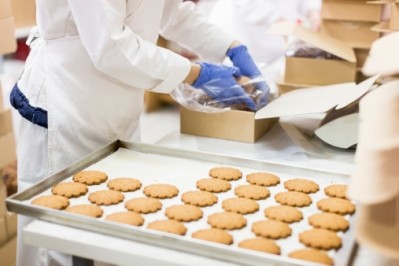Firms turn to external engineers to fill internal skills gap

At a recent conference organised by Mitsubishi Electric Europe (MEE) on continuous improvement in food and beverage production, the firm’s industry sales manager John Rowley described MEE’s services.
These range from overall equipment effectiveness (OEE) and energy consultations to asset audits; site-specific demonstrations to project and applications support. Some of these initial assessments are at no cost or obligation, claimed Rowley. They include a “process walk through” to identify “pinch points” in operations, which will enable efficiency improvements to be made. Advice on automation and training is also available.
Rowley cited MEE’s work with a Yorkshire pudding manufacturer to increase productivity via improved deposition and monitoring technologies, which resulted in reduced giveaway. Another case study automated cookie production using vacuum gripper technology.
‘Impressive reductions’
Elsewhere, Kerry Foods has achieved impressive reductions in its energy consumption and associated cost savings at its plant at Spalding in Lincolnshire with the help of Brammer – UK distributor of maintenance, repair and overhaul services. The work at Kerry also provided a significant reduction in carbon emissions.
“Our audit of the Kerry Foods facility soon established that motors powering three separate systems were constantly running at full capacity, with no means of controlling speed to match demand,” said Brammer regional key account executive Andy Hickin. “After demonstrating the possible carbon savings – as well as the short payback period – achievable by providing variable speed control to these motors, an upgrade project was agreed with the customer.”
The motors involved in the project included a 7.5kW motor used to maintain higher air pressure within the plant than outside; an 18.5kW motor powering high-pressure hot water for equipment wash-downs; and a 15kW motor delivering water for hand washing at a lower pressure. With the water motors running 24 hours a day and the air pressure running at full speed 13.5 hours a day, all across five days a week, the motors had a combined running cost of more than £18,000 per year.
‘Cost saving’
Brammer’s recommendation of fitting Siemens variable speed drives (VSDs) to each system has resulted in an annual cost saving of more than £9,000, coupled with a carbon emissions reduction of 67t/year. The drives enable the control of motor speed to match the flow demand within the factory, and payback for two of the motors was achieved in less than six months.
Stuart Burgess, engineering services group leader at Kerry Foods in Spalding, said: “Reducing carbon emissions is key to the food and beverage industry at present, with manufacturers tasked with achieving a significant reduction in consumption by 2020. With the help of Brammer and the newly installed VSDs, we have made a big step towards hitting our targets and optimising efficiency.”















